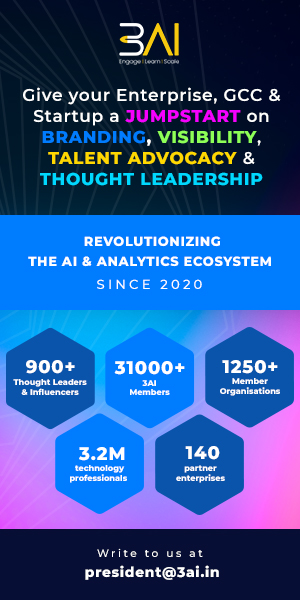The Role of Customer Experience in Digital Transformation
3AI October 28, 2020

Customer Experience Focused Digital Transformation of business
Gone are the days when implementing digital business used to mean centralization of information and automation of tasks to achieve optimization. The ‘digital’ now refers to a new way of looking at business, a complete transformative approach of the Enterprise Business Model , promising far-reaching effects, and readying the business for a new age of tech-savvy customers and their digital centric lifestyle.
There could be any number of factors which could lead to initiating digital business implementation. It could start from the drive to optimize or completely re-architect the supply chain, or from the objective to better manage the finance of the business. It could be triggered using latest acquisitions of technically enabled startups or using alliances with partnering tech firm for a joint venture. But we can be sure that digital transformation is going to continue being adopted in mass, and none would be a bigger catalyst to call for digital transformation than the rising need of providing a better Customer Experience.
The evolution towards complete digital transformation is witnessing a step by step moving trend, where the transforming businesses showcase the following traits:
- Replacing the older trend of implementing back-office automation, marketing initiatives are now applying technology first at the front-end to influence the customer experience. This usually involves implementing vanilla implementation of tech upgrades which can be implemented and updated quickly.
- Second step towards digital transformation is to decrease the reliance on off-the-shelf technology integration packages and move towards a more customized, emerging tools and techniques, in which the business process is managed not by a singular system, but a set of custom emerging tools and techniques. This is the point where businesses can create their own unique digital value proposition.
- The final phase of digital transformation involves complete rethinking of products, features and services as per the expectations of the ever-evolving digital customers and to influence the customer expectations, and consequently find new growth opportunities.
Executing the Digital Transformation Initiatives
Not only is the digital business completely different from the legacy enterprise model, but even implementation measures of the digital transformation are different from those of the older perspective of digital business. Previously, businesses used to focus on tasks which meant digital implementation involved optimizing the task. For example, previously, calling for increased customer engagement meant automating marketing tasks to cater to bulk customers which might optimize the marketing task itself, but does not improve on the conversion numbers. The new ‘digital’ philosophy focuses on Customers instead of the marketing task which means selling to them as individuals, instead of looking at them as mass-market segments.
When customers become the focus, it also involves changing the life-cycle of customer relationship. Now the relationship doesn’t end with a purchase of a product or conversion but continues as extended support and further analysis of the customer buying and usage metrics to forward to them insights on what they can buy next. Hence companies need to transition from a product to service company. It is more important, thus, in current landscape to retain customers than to find new ones since it is more economical and easier to convert existing customers (for another sale) as businesses already possess much insights around them. This is evident with top companies moving to subscription instead of a regular product purchase model.
The organization structure also has gone major changes. Apart from the traditional approach of recruiting IT project manager and marketing managers, businesses are bringing in cognitive scientists, anthropologists, even psychologists for deep insights on customer expectations. Add to that cross-industry experts and transformation managers to implement quickly and in precise manner, the new digital perspective.
The traditional implementation approach of project management involving project definition, creation of finalized design document, development and end-user deployment would not work in the current scenario. The project management itself has to undergo change from defined objective oriented to discovery oriented, where direction and approach is decided by building hypothesis, developing theories and a multiple iterative cycle of launch-test-modify operation. This means the budgets are flexible and decided late into the implementation.
Finally, a discovery-based project management approach means taking more risks, which can only be backed by a flexible budget. This means there needs to be a wiggle-room to release additional budget with the focus on finding new and valuable implementation methodologies which leads to breakthroughs in performance metrics instead of marginal incremental improvements, which will at a later stage, more than compensate for the extra budget.
Key Points for Customer experience Focused Digital Business Transformation Approach
Smaller Core Teams
One of the reasons the startups are able to evolve quickly to disrupt their market is because of smaller teams working in agile manner. This needs to be applied during the digital transformation also. Large teams move slow and lead to a lot of time spent in achieving unidirectional inclination.
Engage Cognitive Scientists and Behavioral Experts
Traditional methods of just collecting profiles and personal traits of customers is not going to bring about breakthroughs. It requires deep level insights on how customers use the products/services in their day-to-day life. This requires Recruiting cognitive and behavioral scientists. The richer the information on customer experience, the better the competitive advantage a business could have.
Implement Agile Marketing Principles
Product releases should be incremental and evolutionary, leveraging launch-and-learn methodology, instead of single big-bang plan. There are more risks involved, but keeping the iterative steps smaller would mean lesser risks.
Conclusion
It would be wrong to view the digital transformation as a one-time effort, rather a series of implementation measures committed in a perennial manner. Hence the transformation is not a process which takes the business from one model to another, but an adoption of a new ideology of functioning itself. Since transformation measures will keep coming around later in the future, it becomes imperative for companies to build ‘Digital Transformation’ as a core competency. In the future, the competitive advantage would have evolved into the ability to, quickly and constantly, build digital transformation with the onset of better and richer insights into Customer Experience.






